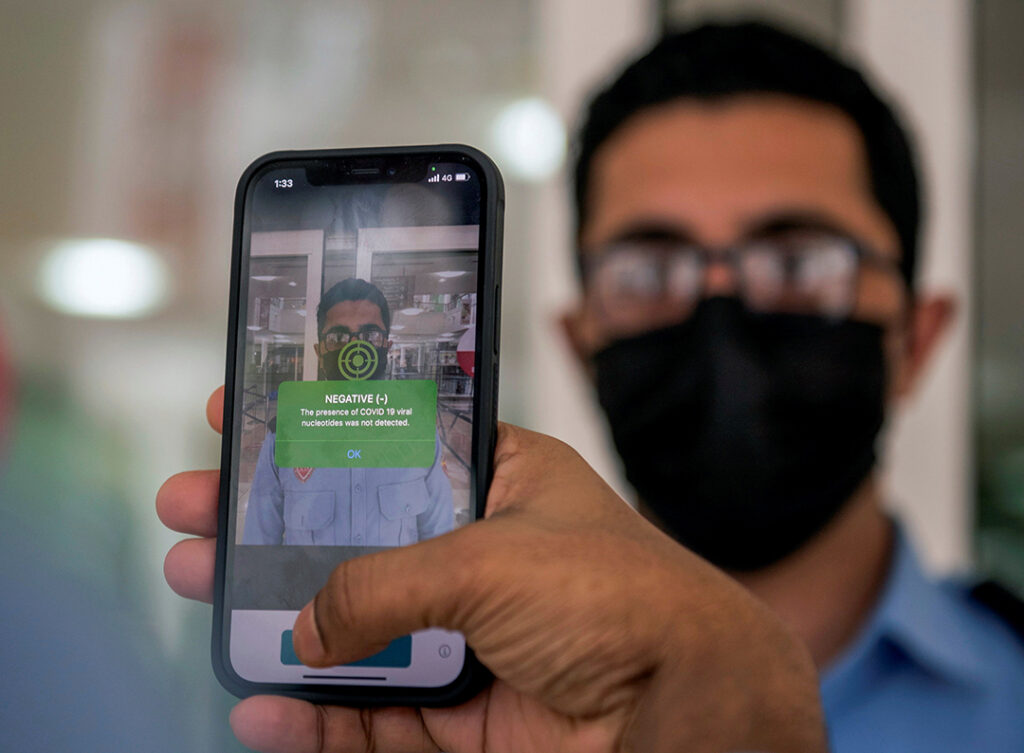ADF STAFF
A traveler at Abeid Amani Karume International Airport in Zanzibar, Tanzania, stopped in front of an official holding what looked like a large blue cellphone. He pointed the device at the traveler and within seconds determined he was COVID-19 negative and could continue his journey.
The device, an exponential deep examination (EDE) scanner, was developed by the Abu Dhabi Research Institute and health management company Sanimed. The scanners, the first of their kind in Africa, use technology that can detect a possible COVID-19 infection by measuring electromagnetic waves, which change when particles of the virus are in a person’s body, according to a news release.
“When a person on arrival comes, our health personnel will hold a phone with the EDE technology at a one- to five-metre distance to test for Covid-19,” project manager Mohammad Gulrez told Tanzanian newspaper The East African.
The scanners are safe, noninvasive and the results are immediate. They were tested on 20,000 patients before being approved by United Arab Emirates (UAE) health officials. They have been used in UAE airports, train stations, shopping malls, schools and offices since last year. They arrived in Zanzibar on February 16.
“The pandemic has had an unprecedented impact on individuals, communities and industries, in particular the travel industry,” Zanzibari President Hussein Mwinyi said in a report by African Business. “For this reason, we are pleased to collaborate with Sanimed, a subsidiary of IHC Group, to launch these innovative EDE scanners in Zanzibar, to introduce greater efficiency for travelers coming through Zanzibar as a port of entry.”
Popularly known as the “spice islands,” Zanzibar is a popular destination for tourists interested in its coconut and spice plantations. A semiautonomous group of 50 islands, Zanzibar has been unified with Tanzania since 1964.
Although Zanzibar’s economy was initially slowed by the pandemic, it grew by 8.8% in the third quarter of 2021, higher than its 3.3% growth in the third quarter of 2020, according to Tanzanian newspaper The Citizen. The growth was largely attributed to a resumption of economic activities, mainly tourism.
Nassor Ahmed Mazrui, Zanzibar’s health minister, said the new screenings are expected to help ease travel restrictions and “make the lives of those flying affordable.”
“The vital concern of the Ministry of Health is to see that Zanzibar is safe, a safe place for people, including tourists, to come and enjoy,” Mazrui told Tanzanian newspaper The East African. “So we have adopted a number of activities that are available in the world to make sure all persons coming to Zanzibar also come in a safer way.”
Ajhay Bhatia, chief executive officer of Sanimed International, lauded Africa for continuing to be a “hotbed of innovation and technology.” In a news release, Bhatia said Sanimed will partner with Tanzanian diagnostics laboratory company Alfa Care on a $1 billion project to deploy a state-of-the-art laboratory and testing facilities to integrate with the scanner technology.

